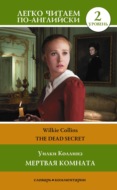Kitobni o'qish: «Незнакомка из Уайлдфелл-Холла. Уровень 2 / The Tenant of Wildfell Hall»
© С. А. Матвеев, адаптация текста, коммент. и словарь, 2023
© ООО «Издательство АСТ», 2023
Chapter I
You must go back with me to the autumn of 1827. My father, as you know, was a farmer. I, by his desire, not very willingly, was burying my talent in the earth. My mother persuaded me that I was capable of great achievements; but my father assured me it was all rubbish, and exhorted me to follow his steps.
“Well! An honest and industrious farmer is one of the most useful members of society,” I consoled myself one cold, damp, cloudy evening. I was young then, remember – only four-and-twenty.
I ascended to my room. I met a smart, pretty girl of nineteen, with a tidy, dumpy figure, a round face, bright cheeks, glossy curls, and little merry brown eyes. This was my sister Rose. My mother was sitting in her arm-chair at the fireside and knitting, according to her usual custom, when she had nothing else to do. The servant brought in the tea-tray.
“Well! Here they both are!1” cried my mother. “Now shut the door, and come to the fire. I'm sure you must be starved. Tell me what you were doing all day.”
“I'll tell you what I was doing,” said Rose. “You know that somebody was going to take Wildfell
Hall – and – what do you think? It was inhabited a week! – and we never knew!”
“Impossible!” cried my mother.
“Preposterous!” shrieked my brother Fergus.
“It has indeed! – and by a single lady!”
“Good gracious, my dear! The place is in ruins!”
“But there she lives, all alone – except an old woman for a servant!”
“Oh, dear! That spoils it – I hoped she was a witch,” observed Fergus.
“Nonsense,
Fergus! But isn't it strange, mamma?”
“Strange! I can hardly believe it.”
“But you may believe it; for Jane Wilson saw her. She went with her mother. So the tenant is called Mrs. Graham, and she is in mourning2. She is quite young, they say, not above five or six and twenty, but very reserved! They tried to find out who she was and where she came from, and, all about her. But neither Mrs. Wilson, nor Miss Wilson managed to elicit a single satisfactory answer, or even a casual remark. Eliza Millward says her father intends to call upon her3 soon, to offer some pastoral advice, which he fears she needs. And we must see here, too, some time, mamma.”
“Of course, my dear. How lonely she must feel!”
The next day my mother and Rose visited the fair recluse. Mrs. Graham betrayed a lamentable ignorance on certain points, they said.
“On what points, mother?” asked I.
“On household matters and cookery. I gave her some useful pieces of information, however, and several excellent receipts. But she begged not to trouble her, as she lived in such a plain, quiet way, that she was sure she did not need them. 'No matter, my dear,' said I; 'it is what every respectable female ought to know. Though you are alone now, you will not be always so. You were married, and probably will be again.' 'You are mistaken there, ma'am,' said she, almost haughtily; 'I am certain I never shall.' But I told her I knew better.”
“Some romantic young widow, I suppose,” said I. “She came there to end her days in solitude – but it won't last long.”
“No, I think not,” observed Rose; “and she's excessively pretty – handsome rather – you must see her, Gilbert. Though you can hardly pretend to discover a resemblance between her and Eliza Millward.”
The next day was Saturday; and, on Sunday, everybody wondered whether or not the fair unknown profited by the vicar's remonstrance. Will she come to church?
Yes, she came there. And there I beheld a tall, lady-like figure in black. Her face was towards me, and there was something in it which invited me to look again. Her hair was black, she had long glossy. Her complexion was clear and pale. Her eyes were concealed by their lids and long black lashes. The forehead was lofty and intellectual.
She raised her eyes, and they met mine. I did not withdrew my gaze, and she turned again to her prayer-book, but with a momentary, indefinable expression of quiet scorn.
Now, Halford, before I close this letter, I'll tell you who Eliza Millward was. She was the vicar's younger daughter. I liked her; and she knew. But my mother did not bear the thoughts of my marrying that girl, who had not even twenty pounds, as my mother said. Eliza's figure was plump, her face small and round. Her eyes were long and narrow in shape. Her voice was gentle and childish.
Her sister, Mary, was several years older and several inches taller. Her father, all dogs, cats, children, and poor people loved her very much.
The Reverend Michael Millward himself was a tall, ponderous elderly gentleman, who placed a shovel hat4 above his large, square, massive-featured face. He carried a stout walking-stick in his hand. He was a man of fixed principles, strong prejudices, and regular habits.
He cared for his bodily health. He took a walk before breakfast, was vastly particular about warm and dry clothing. He was gifted with good lungs and a powerful voice, – and was, generally, extremely particular about what he ate and drank.
I will mention two other persons. These are Mrs. Wilson and her daughter. The former was the widow, whose character is not worth describing. She had two sons, Robert, a farmer, and Richard, a studious young man, who was preparing for college.
Their sister Jane was a young lady of some talents, and more ambition. She received a regular education. She was about six and twenty, rather tall and very slender. Her hair was neither chestnut nor auburn, but light red. Her complexion was remarkably fair and brilliant, her head small, neck long, lips thin and red, eyes quick. She had many suitors in her own rank of life, but she scornfully repulsed or rejected them all. She was waiting for a rich gentleman. One gentleman there was. This was Mr. Lawrence, the young squire, whose family formerly occupied Wildfell Hall, but deserted it, fifteen years ago.
Now, Halford, I bid you adieu for the present5.
Yours immutably,
Gilbert Markham.
Chapter II
On Tuesday I was out with my dog and gun. I turned my arms against the hawks and carrion crows. I mounted the steep acclivity of Wildfell, the wildest and the loftiest eminence in our neighbourhood. Near the top of this hill, about two miles from Linden-Car, stood Wildfell Hall, a mansion of the Elizabethan era, venerable and picturesque, but doubtless, cold and gloomy enough to inhabit.
I killed a hawk and two crows when I came to the mansion. I paused beside the garden wall, and looked. I beheld a tiny hand above the wall. It clung to the topmost stone, and then another little hand raised. Then appeared a small white forehead, with wreaths of light brown hair, with a pair of deep blue eyes beneath, and a diminutive ivory nose.
The eyes did not notice me, but beheld Sancho, my beautiful black and white setter. The child (a little boy, apparently about five years old) raised his face and called aloud to the dog. The dog looked up, and wagged his tail, but made no further advances. The boy called and called again and again; then he attempted to get over. But an old cherry-tree caught him by the frock. There was a silent struggle, and then a piercing shriek. I dropped my gun on the grass, and caught the little fellow in my arms.
I wiped his eyes with his frock, and called Sancho to pacify him. He was just putting little hand on the dog's neck and beginning to smile through his tears, when I heard behind me a click of the iron gate, and a rustle of female garments, and lo! Mrs. Graham darted upon me.
“Give me the child!” she said. She seized the boy and snatched him from me.
“I was not harming the child, madam,” said I; “he was tumbling off the wall there. I was so fortunate as to catch him, while he hung from that tree.”
“I beg your pardon, sir,” stammered she; “I did not know you; and I thought – ”
She stooped to kiss the child, and fondly clasped her arm round his neck.
“You thought I was going to kidnap your son, I suppose?”
She laughed and replied, -
“I did not know he was climbing the wall. You are Mr. Markham, I believe?” she added abruptly.
I bowed.
“Your sister called here, a few days ago, with Mrs. Markham.”
“Is the resemblance so strong then?” I asked, in some surprise.
“There is a likeness about the eyes and complexion I think,” replied she; “and I think I saw you at church on Sunday.”
I smiled.
“Good-morning, Mr. Markham,” said she; and without another word or glance, she withdrew, with her child, into the garden.
I returned home, angry and dissatisfied. Then I to the vicarage, to solace my spirit and soothe my temper with the company and conversation of Eliza Millward.
I found her, as usual, busy with embroidery.
“You're so unfortunate, Mr. Markham!” observed the younger sister. “Papa's just gone out into the parish!”
“Never mind6; I am going to a few minutes with his daughters,” said I.
We were mutually pleased with each other, maintained between us a cheerful and animated conversation. I tenderly squeezed Eliza's little hand at parting; and she repaid me with one of her softest smiles. I went home very happy. I was overflowing with love for Eliza.
Chapter III
Two days after, Mrs. Graham called at Linden-Car. Mrs. Graham brought her child with her and said,
“It is a long walk for him; but I must take him with me; for I never leave him alone.”
“But you have a servant,” said Rose; “can you leave him with her?”
“She has her own occupations; and besides, she is very old, and he is very mercurial.”
“But you left him to come to church.”
“Yes, once; but I won't leave him for any other purpose. I think, in future, I must bring him with me, or stay at home.”
“Is he so mischievous?” asked my mother.
“No,” replied the lady, as she stroked the wavy locks of her son; “but he is my only treasure, and I am his only friend: so we don't like to be separated.”
“But, my dear, I call that doting7,” said my plain-spoken parent. “You must try to suppress such foolish fondness, as well to save your son from ruin as yourself from ridicule.”
“Ruin! Mrs. Markham!”
“Yes; it is spoiling the child. Even at his age. Shame on him.”
“Mrs. Markham, I beg you will not say such things, in his presence, at least. I trust my son will never be ashamed to love his mother!” said Mrs. Graham, with a serious energy that startled the company.
“Just as I thought,” said I to myself: “the lady's temper is none of the mildest.”
All this time I was seated at a table on the other side of the room. In a little while, however, someone was approaching me. It was little Arthur. My dog Sancho attracted him. A little encouragement induced him to come forward. The child, though shy, was not sullen. In a minute he was kneeling on the carpet, with his arms round Sancho's neck. In a minute or two more, the little fellow was seated on my knee.
“Arthur,” said Mrs. Graham, “come here. You are troublesome to Mr. Markham: he wishes to read.”
“By no means, Mrs. Graham; pray let him stay,” pleaded I.
But she silently called him.
“No, mamma,” said the child; “let me look at these pictures first; and then I'll come, and tell you all about them.”
“We are going to have a small party on Monday, the fifth of November,” said my mother; “and I hope you will not refuse to make one, Mrs. Graham. You can bring your little boy with you, you know.”
“Thank you, I never go to parties.”
“Oh! but this will be quite a family concern – nobody here but ourselves, and just the Millwards and Wilsons, most of whom you already know, and Mr. Lawrence, your landlord.”
“Oh, you must excuse me this time. The evenings now are dark and damp, and Arthur, I fear, is very delicate. We must defer the enjoyment of your hospitality till the return of longer days and warmer nights.”
Rose produced a decanter of wine, with glasses and cake, from the cupboard. The guests both ate the cake, but obstinately refused the wine. Arthur looked at the ruby nectar in terror and disgust.
“Never mind, Arthur,” said his mamma; “Mrs. Markham thinks it will do you good, as you were tired with your walk. But she will not oblige you to take it! He detests the very sight of wine,” she added, “and the smell of it almost makes him sick.”
“Well, Mrs. Graham,” said my mother, “well, you surprise me. What a poor child! Only think what a man you will make of him, if you persist in – ”
“By that means,” interrupted Mrs. Graham, with imperturbable gravity, “I hope to save him from one vice at least.”
“But by such means,” said I, “you will never render him virtuous8. What is virtue, Mrs. Graham? Must one resist temptation? But if one has no temptations to resist? Is he a strong man that overcomes great obstacles, or he that sits in his chair all day, with nothing to do? You must not clear the stones from his path, but teach him to walk firmly over them. Let him learn to go alone.”
“I will lead him by the hand, Mr. Markham, till he has strength to go alone. I will clear as many stones from his path as I can, and teach him to avoid the rest. It is all very well to talk about noble resistance, and trials of virtue; but for fifty – or five hundred men that have yielded to temptation, show me one that had virtue to resist.”
“You are very complimentary to us all,” I observed.
“I know nothing about you – I speak of those I do know. He will have temptations enough to assail him, both from within and without.”
“Yes,” said my mother; “but, my dear Mrs. Graham, let me warn you against the error – the fatal error, I may call it: don't take that boy's education upon yourself. Because you are clever in some things and well informed, you may fancy yourself equal to the task; but indeed you are not. And if you persist in the attempt, believe me you will bitterly repent it.”
“I must send him to school, I suppose, to learn to despise his mother's authority and affection!” said the lady, with a bitter smile.
“Oh, no! But you will treat him like a girl – you'll spoil his spirit, and make a girl of him. I'll ask Mr. Millward to talk to you about it. I don't doubt, he'll be able to convince you in a minute.”
“No occasion to trouble the vicar,” said Mrs. Graham. “Anyway, it's time to go. Arthur!”
She slightly bowed, and was about to withdraw; but her son, with childish impertinence, exclaimed,
“Mamma, you have not shaken hands with Mr. Markham!”
She turned round and held out her hand. I gave it a spiteful squeeze.
Chapter IV
Our party, on the 5th of November, passed off very well, in spite of Mrs. Graham's refusal to grace it with her presence. My mother, as usual, was cheerful and chatty, full of activity and good-nature.
Mr. Millward told important dogmas and sententious jokes, pompous anecdotes and oracular discourses. Mrs. Markham, the polite Mr. Lawrence, the sedate Mary Millward, the quiet
Richard Wilson, and Robert listened to him very attentively.
Mrs. Wilson was more brilliant than ever, with her fresh news and old scandal, trivial questions and remarks. Her daughter Jane was, of course, as graceful and elegant, as witty and seductive. Here were all the ladies to outshine, and all the gentlemen to charm, – and Mr. Lawrence, especially, to capture and subdue.
Richard Wilson, Jane's younger brother, sat in a corner, silent and shy. Rose informed me that he favoured us with his company because of his sister Jane, who was anxious to show Mr. Lawrence that she had at least one brother more gentlemanly and refined than Robert.
Mary Millward was mute. She was rather sullen than diffident. Eliza told me she came because her father insisted upon it.
My Eliza was charming beyond description, coquettish without affectation, and desirous to engage my attention. She belied by saucy words and gestures.
Rose was simple and natural as usual, and full of mirth and vivacity. Fergus was impertinent and absurd. And finally (for I omit myself), Mr. Lawrence was gentlemanly and inoffensive to all, and polite to the vicar and the ladies, especially his hostess and her daughter, and Miss Wilson – a blind man! He had not the taste to prefer Eliza Millward. He seldom quitted the secluded place of his birth, where he lived in solitary state. I was the companion most agreeable to his taste. I liked the man well enough, but he was too cold, and shy, and self-contained, to obtain my cordial sympathies.
His heart was like a sensitive plant, that opens for a moment in the sunshine, but curls up and shrinks into itself at the slightest touch of the finger, or the lightest breath of wind. Our intimacy was rather a mutual predilection than a deep and solid friendship. Mr. Lawrence was like a new garment, all very neat and trim to look at, but very tight in the elbows.
Soon after the arrival of the guests, my mother mentioned Mrs. Graham. My mother regretted she was not there, and explained to the Millwards and Wilsons the reasons.
“She is a very strange lady, Mr. Lawrence,” added she; “we don't know what to think of her. But you can tell us something about her, for she is your tenant, you know. And she said she knew you a little.”
All eyes were turned to Mr. Lawrence.
“I, Mrs. Markham!” said he; “you are mistaken. I don't – that is – I have seen her, certainly; but I can't tell anything about Mrs. Graham.”
He then immediately turned to Rose, and asked her to favour the company with a song, or a tune on the piano.
“No,” said she, “you must ask Miss Wilson: she plays and sings much better.”
Miss Wilson demurred.
“She'll sing readily enough,” said Fergus, “if you stand by her, Mr. Lawrence, and turn over the leaves9 for her.”
“I shall be most happy to do so, Miss Wilson; will you allow me?”
She bridled her long neck and smiled. After that she played and sang, one piece after another; while he stood patiently by, and turned over the leaves of her book.
“I don't take wine, Mrs. Markham,” said Mr. Millward; “I'll take a little of your home-brewed ale10. I always prefer your home-brewed to anything else. There's nothing like this, Mrs. Markham!” said he. “I always maintain that there's nothing to compare with your home-brewed ale. These things are all blessings and mercies, if we only knew how to make use of them.”
“But Mrs. Graham doesn't think so. You'll just hear now what she told us the other day,” said my mother
And my mother favoured the company with a particular account of that lady's ideas,
“Now, don't you think it is wrong?”
“Wrong!” repeated the vicar, with more than common solemnity, “criminal, I say, criminal! She is making a fool of the boy, despising the gifts of Providence, and teaching him to trample them under his feet.”
Mr. Lawrence sat with his elbow on the table, and covertly smiled to himself.
“But don't you think, Mr. Millward,” suggested he, “that when a child may be naturally prone to intemperance – by the fault of its parents or ancestors, for instance – some precautions are advisable?” (Mr. Lawrence's father shortened his days by intemperance).
“Some precautions, it may be; but temperance, sir, is one thing, and abstinence another.”
“With some persons, temperance – that is, moderation – is almost impossible. A parent's authority cannot last for ever. Children are naturally prone to hanker after forbidden things. It seems to me, that this plan of Mrs. Graham's, as you describe it, Mrs. Markham, is not without its advantages.”
He pushed his chair a little away from the table, and leant back towards me – and carelessly asked me if I knew Mrs. Graham.
“I have met her once or twice,” I replied.
“What do you think of her?”
“I cannot say that I like her much. She is handsome, but not amiable. She too hard, too sharp, too bitter for my taste.”
He made no reply, but looked down and bit his lip.
After that we were dancing. Then I followed Eliza to help her with her shawl. And I snatched a kiss behind her father's back. But alas! I turned round, and there was my mother close beside me. When the guests departed, she said to me,
“My dear Gilbert, you know how I love you and prize you above everything else in the world. But how bitterly it will grieve me to see you married to that girl – or any other in the neighbourhood. What you see in her I don't know. There's neither beauty, nor cleverness, nor goodness, nor anything else in her. Wait awhile and see! If you bind yourself to her, you'll repent it all your lifetime.”
“Well, mother, do be quiet! I'm not going to marry yet, I tell you. But I want to enjoy myself.”
“Yes, my dear boy, but not in that way. Indeed, don't do such things. You'll get entangled in her snares before you know where you are. And if you marry her, Gilbert, you'll break my heart.”
“Well, don't cry about it, mother,” said I; “don't abuse Eliza anymore. I'll promise to think twice before I take any important step.”
I lighted my candle, and went to bed.








